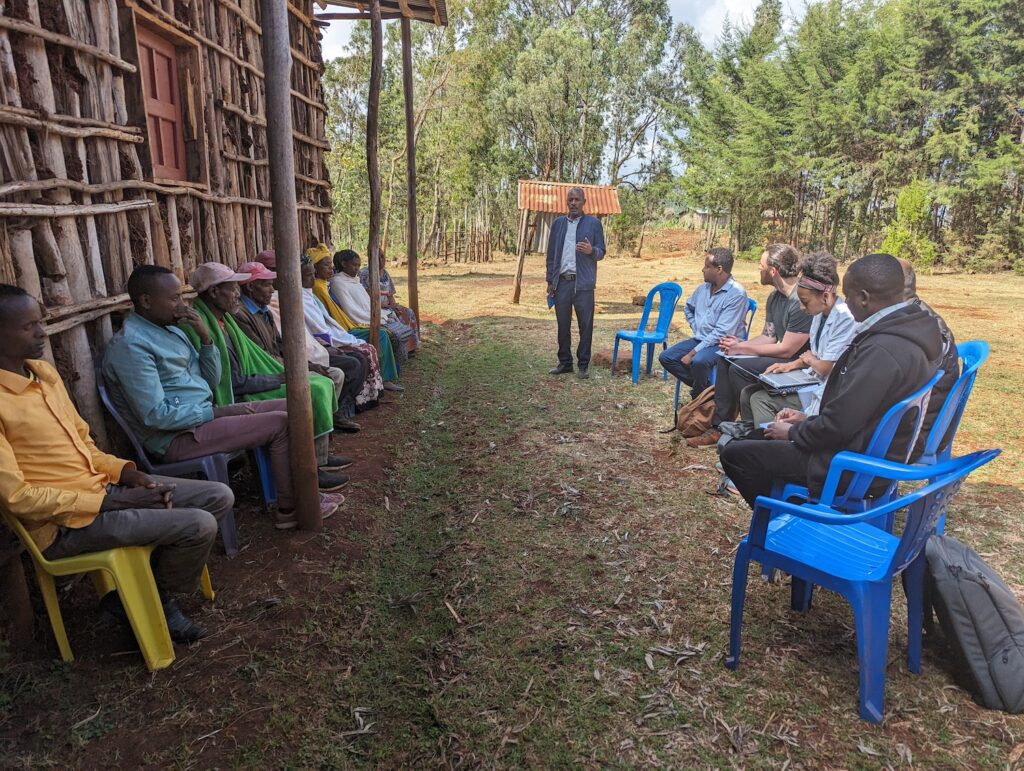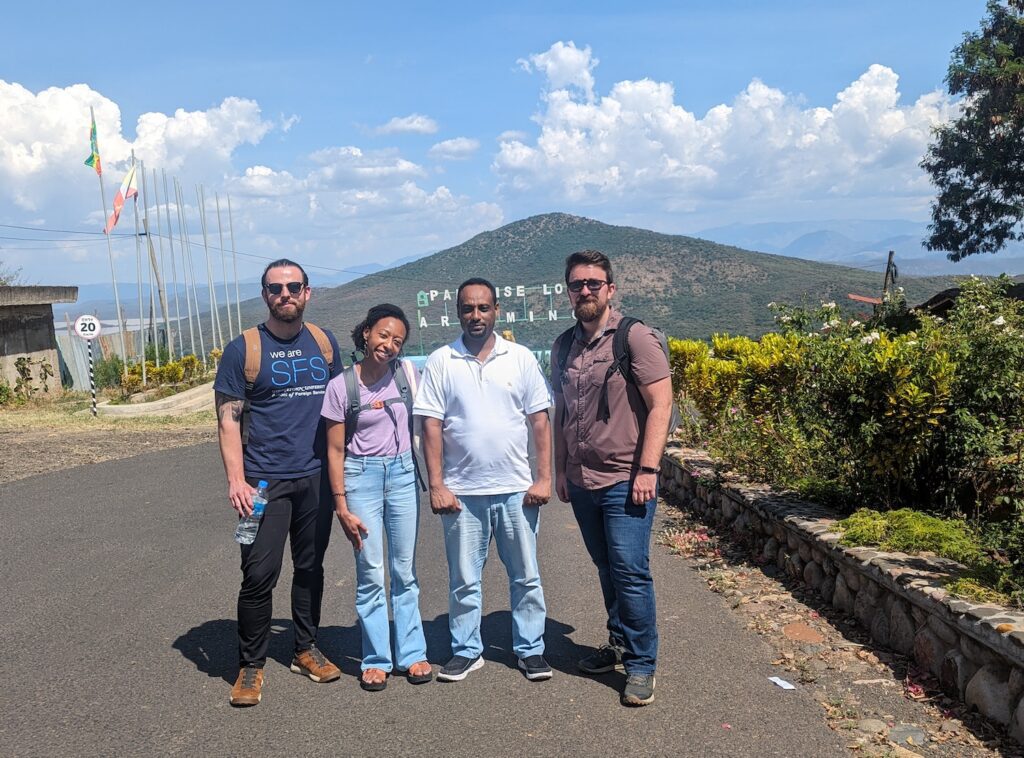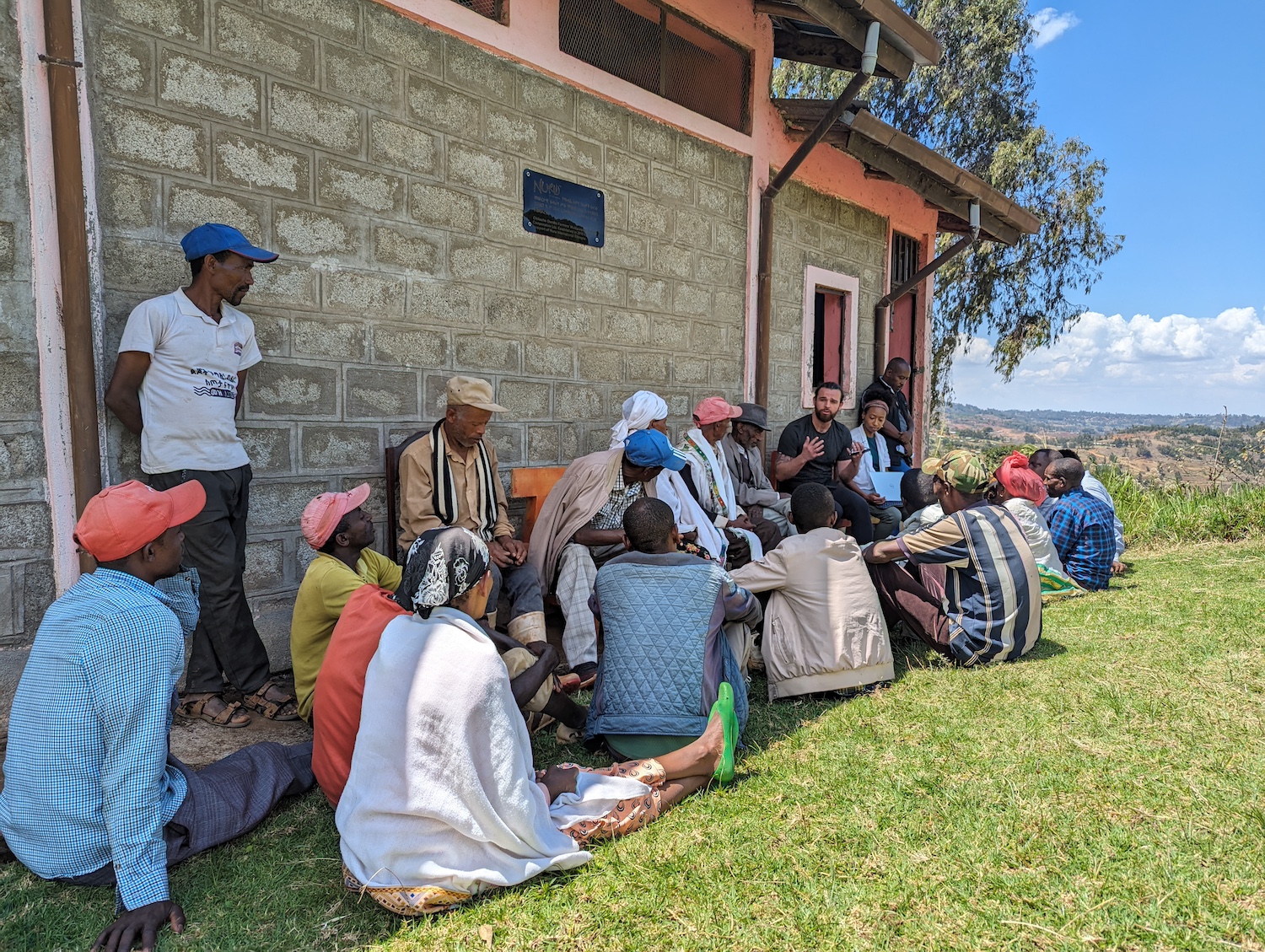In October 2023, Nuru began a partnership with Georgetown University’s Global Human Development (GHD) Program to host two masters’ researchers dedicated to exploring how the Nuru model supports farmers in building their resilience to climate shocks and stressors. Over the course of this partnership, Irla Atanda and Madison Davis employed various qualitative research methods to evaluate Nuru’s model and connected with prominent researchers and organizations in the fields of climate change and agriculture. This research included travel to Arba Minch, Ethiopia, to conduct in-person focus groups and individual interviews with farmers facing the brunt of climate shocks. Additionally, Irla and Madison engaged with local researchers and other experts in Ethiopia to identify practices and methods for farmers to mitigate climate shocks.

Georgetown students meet with a farmer cooperative agribusiness.
How are Ethiopian Farmers Experiencing Climate Shocks?
Smallholder farmers in Ethiopia endure a multitude of climate-related shocks and stressors, ranging from erratic rainfall patterns to soil erosion, pest infestations, and limited access to essential inputs, such as drought-tolerant seeds. As the effects of climate change intensify, the heightened unpredictability of these shocks exacerbates farmers’ vulnerabilities. While the Ethiopian government offers assistance through extension agents who educate farmers on climate-smart practices, this assistance is limited, particularly for the more remote farmers that Nuru works with. Many farmers residing in remote rural areas find themselves without any form of support to confront the compounding challenges they face.

Irla and Madison, Georgetown University GHD Masters students, meet with Hidota Union leaders
During their research, Irla and Madison conducted focus group interviews with both Nuru-supported and non Nuru-supported smallholder farmers, and engaged in key-informant interviews with local researchers, technical experts, and community leaders. They also spoke with international experts at organizations such as the Millennium Challenge Corporation, Mastercard Foundation, and IFPRI. These diverse discussions aimed to identify the prevalence of economic and climate shocks experienced by farmers and shed light on coping mechanisms. Farmers unanimously expressed concern over the escalating severity of shocks, and certain farmers, especially those in the non Nuru-supported communities, voiced frustration over the lack of viable strategies to alleviate the adverse effects they face.
“It was both compelling and concerning to hear firsthand how climate change has affected these communities in the past few decades. Volatile weather patterns and rising input prices are causing smallholder farmers to lose confidence in their harvests, as frequent and prolonged droughts add extra risks to each planting season. After focus group discussions with the Nuru-supported and non Nuru-supported farmers, it became evident that Nuru’s intervention provides much needed relief in the form of increased market access, tailored technical assistance, and subsidized inputs. As the world’s climate continues to transform the agricultural landscape, it is critical for organizations such as Nuru to support smallholder farmers in adapting to these changes with specialized interventions that address the unique challenges they face. Building the climate resilience of these communities will be vital for feeding the future of the Sahel, the African continent, and the planet writ large.” -Madison Davis

Madison Davis
How does Nuru support farmers against climate shocks?
Irla and Madison’s research illuminated several effective strategies that offer tangible benefits to these farmers, with some already being implemented by Nuru Ethiopia. Among these strategies, farmers emphasized the significance of participation in cooperative agribusinesses, citing it as one of the most effective mitigation measures. Cooperative membership not only grants farmers access to vital inputs and training on climate-smart practices, but also ensures consistent input and sale prices. Through cooperative agribusinesses, farmers have a communal support system that equips them to enhance their livelihoods, which ultimately leads to increased income and greater food security for farmers and their families.
Additionally, the importance of providing early warning systems and advisory services to farmers in anticipation of changing weather patterns was underscored. One such service, ignitia, is currently being utilized by Nuru Nigeria, Nuru Burkina Faso, and Nuru Ghana. Ignitia offers hyper-local, highly accurate weather forecasts and agricultural advisories to farmers in the tropics via text messages. This turns the weather from an unpredictable threat into an asset by supporting climate-smart decision-making.
Nuru Ethiopia is actively developing a comprehensive climate adaptation and mitigation strategy, aiming to integrate insights like these into its tailored programs in order to implement proactive measures that support farmers amidst the evolving climate challenges they face. This policy will build upon current programming to diversify livelihoods, offering farmers a better capacity to mitigate climate effects on specific value chains, and offering resilience crop value chains such as mung beans, increasing household food security.
Looking Forward: Scaling Climate-Sensitive Programming to West Africa
This part of the analysis used the Ethiopia case study as a basis to provide recommendations on how Nuru can prioritize its climate-smart programming as the organization scales its intervention to other areas across the Sahel and Coastal West Africa. As Nuru expands into new countries, continuing to adapt programs to be responsive to climate challenges is paramount. However, climate shocks can differ across regions, and even between communities. Nuru promotes local leadership and local context to adapt, and Nuru often relies on local expertise, research, and best practices to counter climate shocks and stressors. Irla and Madison sought to understand the varying climate trends across borders, focusing on Ghana, where Nuru is beginning support to smallholder farmers and other potential scaling geographies. 
Left to right: Madison Davis, Irla Atanda, Nuru Ethiopia Managing Director Abiy Meshesha, Nuru MEL Advisor Ian Schwenke
The team’s recommendations offer practical ways for Nuru to support farmers in Ghana and elsewhere through climate-resilient interventions. These findings provide valuable guidance for Nuru as it navigates the complexities of climate adaptation and mitigation in new regions.
“It was an incredible privilege to collaborate with Nuru as our GHD capstone client. Nuru’s mission to empower smallholder farmers is extremely inspiring and important as these communities confront formidable climate-related challenges. From erratic weather patterns and soil degradation to increasing droughts and floods, Ethiopian smallholder farmers navigate these complexities in their rural livelihoods. These concerns were made evident by the smallholder farmers who participated in the focus groups. However, the Nuru-supported farmers, compared to the non-Nuru supported farmers, generally had a more positive outlook on their future. Additionally, many interviewed stakeholders asserted that indigenous crops represent the future of agriculture, food security, and environmental preservation, and conveyed a sense of appreciation for the importance of knowledge and experience at the grassroots level. The fact that Nuru prioritizes community-led initiatives underscores the importance of localization in addressing these issues. By empowering communities to take lead in implementing solutions tailored to their specific contexts, Nuru exemplifies a sustainable model for development and resilience.” – Irla Atanda

Irla Atanda
Nuru will continue collaborating with research partners like Georgetown University to develop tailored programs that benefit smallholder farmers. While climate resilience is crucial, Nuru’s programs also consider gender equity, financial inclusion, and resilience strategies, as these are compounding issues that contribute to extreme poverty.
Partnerships like these provide practical opportunities for learning and improvement. By working together with Georgetown University and others, Nuru can refine its programs and practices to better serve smallholder farmers and equip them to build lasting resilience through sustainable agribusinesses.


